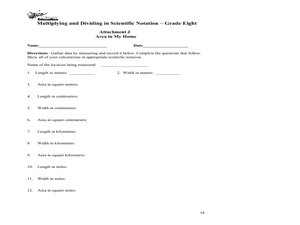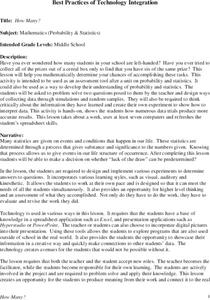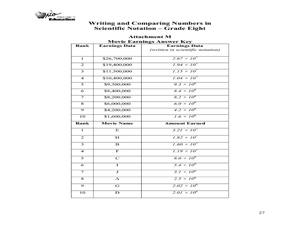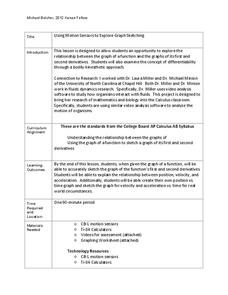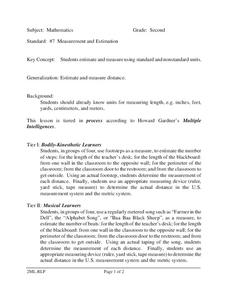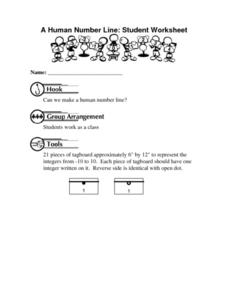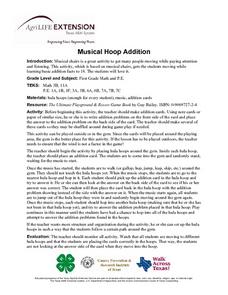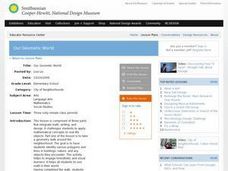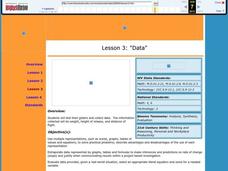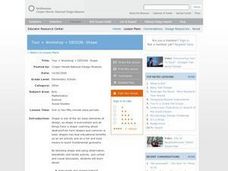Curated OER
MEASURE ME
In this kinesthetic measurement worksheet, students are asked to measure their height, head circumference, lower arm length, calf circumference, hand span and little finger length. They are to choose a unit of measurement for each part...
Curated OER
Transforming Triangles
Sixth graders examine how to graph translations (slides) and reflections (flips) on a coordinate plane. They practice the slides and flips kinesthetically and apply it to a worksheet working with triangles.
Curated OER
Math Lesson Plan
First graders are introduced to how to use a ruler and its purpose. Using a boomerang, they estimate its length and then measure it using a string and ruler. In groups, they practice the same exercise with various objects while...
Curated OER
Y-Intercept and Slope Intercept Form
Alegebra amateurs identify the slope and the y-intercept given a linear equation in slope-intercept form by correctly completing some in class problems. They write the linear equation in slope-intercept form that corresponds to the given...
Curated OER
Yummy Gummy Subtraction
Here is a quick 15 minute lesson intended to introduce subtraction. Learners count and subtract gummy bears to complete 5 problems. The lessons suggest that the gummy bears can be saved and used the next day, but gummy bears get gross...
Core Knowledge Foundation
A “Whole” Lot of Fraction Fun!
Young mathematicians are introduced to fractions in a unit that helps them to understand parts of a whole.
Curated OER
Rap Your Way Through Integers
Your resource or special education class will have fun with this interesting approach to learning about integers. They use rap, movement, and an interactive online game to reinforce the rules of integers. A well-rounded instructional...
Ohio Department of Education
Multiplying and Dividing in Scientific Notation - Grade 8
Here is really nice set of resources on scientific notation. Eighth and ninth graders explore the concept of multiplying and dividing in scientific notation. In this multiplying and dividing numbers in scientific notation instructional...
Curated OER
How Many?
Middle schoolers explore and design ways to collect data through simulations and random samples. They perform two experiments to determine the answers to various probability problems, and present the data/graphs in the form of a...
Ohio Department of Education
Writing and Comparing Numbers in Scientific Notation-Grade Eight
Explore scientific notation in this mathematics lesson plan. Young mathematicians explore multiple representations of large number in scientific notation through the use of models, visual representation and expanded form. The lesson plan...
Curated OER
Dot Plots
Number crunching statisticians explore displaying data with dot plots and define the difference between quantitative data and qualitative data. Dot plots are created based on a set of given data and analyzed.
Kenan Fellows
Using Motion Sensors to Explore Graph Sketching
Get moving to a better understanding of graphs of derivatives. Using motion sensors, scholars vary their velocities to create graphs of the first derivative of a function. The activity challenges groups to first create a script of the...
Curated OER
Introducing Ideas about Inheritance
Is it nature or nurture? In an easily adaptable kinesthetic activity to introduce genetics, learners group themselves based on a variety of categories. They will quickly find that some characteristics are easy to put in order, while...
Curated OER
Measurement and Estimation
Second graders explore estimation and measurement. In this estimation and measurement instructional activity, 2nd graders use footsteps to measure distances around the classroom. Students sing songs to measure the number of beats from...
Curated OER
#3 Differential Calculus
Learners create models of the Mean Value Theorem. In this Mean Value lesson plan, students use their knowledge of derivatives and exponential functions to explore the Mean Value Theorem. They illustrate the meaning of the throrem,...
Curated OER
A Human Number Line: Student Worksheet
Kids are challenged to make a human number line. They line up, holding numbers from -10 to 10. They then add and subtract both positive and negative numbers, using themselves as the numbers on the number line. This is a great way to...
Curated OER
Using Manipulatives to Teach Fractions
There is no doubt that learners remember what they have learned when they have a visual representation. Using an egg carton and candy bars, they explore the concept of fractional amounts. By having pupils cut the egg carton into parts...
Curated OER
Musical Hoop Addition
Musical chairs is a great activity to get children moving while still paying attention and listening. This activity, which is based on musical chairs, gets students moving while learning basic addition facts. They hop from hoop to hoop...
Curated OER
Our Geometic World
Pupils walk around the neighborhood and identify various polygons and lines in buildings, nature and other objects. They design a building using various geometric patterns, shapes and lines. Students complete a descriptive writing of...
Curated OER
What's Shaking? Three-Lesson Unit
Your young architects use the Internet to research tall structures or sky scrapers to help in the design of their scale drawings. This is lesson one of three in which learners design, build, and test model skyscrapers for seismic safety....
Curated OER
Data
Students collect data from an experiment they perform. In this data lesson, students use multiple representations to solve practical problems; describe advantages and disadvantages of the use of each representation. Then, they evaluate...
Curated OER
Let's Count to 20
Budding mathematicians create groups of 10 to 20 objects using numerals to record the size of a group. They construct sets of numbers up to 10, write the numerals up to 10, and count up to 10 rationally. Students also use ten frames and...
Curated OER
Fraction and Decimal Ordering
Ordering numbers just got physical! Learners practice putting numbers in sequence, both in fraction and decimal form. To begin, they line up in birthday order and discuss the difference between ascending and descending. They are then...
Curated OER
Tour + Workshop = DESIGN: Shape
Ask elementary students to explore shapes in everyday objects. They will discuss the elements of design and describe the shapes they see in visual images. Students will then design and "build" a new 3D shape. Finally they will show and...
Other popular searches
- Kinesthetic Math Games
- Kinesthetic Math Activities
- Kinesthetic Math Fractions
- Kinesthetic Math Subtraction
- Kinesthetic Math Lessons
- Kinesthetic Math Plans
- Kinesthetic Math Quadratic
- Kinesthetic Learner Math Time
- Kinesthetic Math Money









